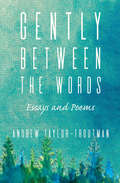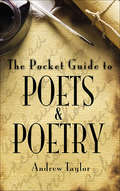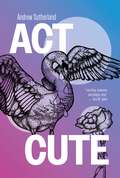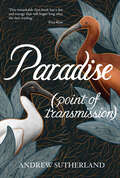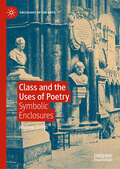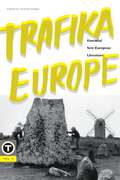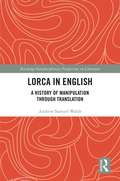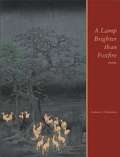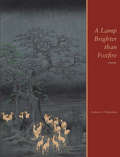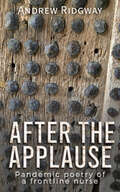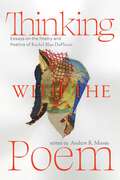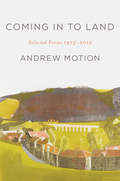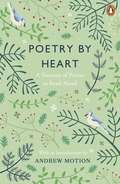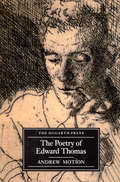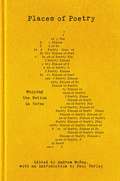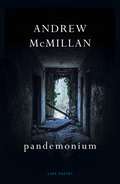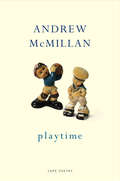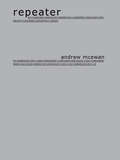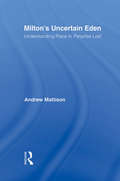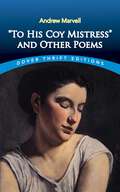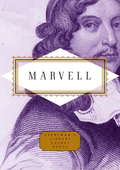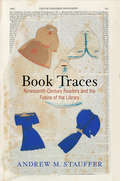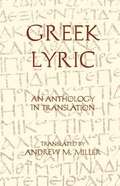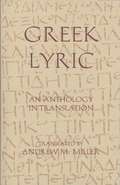- Table View
- List View
Gently Between the Words: Essays and Poems
by Andrew Taylor-TroutmanGently Between the Words guides and instructs our heartsIn his latest collection of essays and poems Taylor-Troutman guides readers through seemingly simple stories of death, life, parenting struggles, successes and failures that speak to larger questions we all face: How do we best spend our time? How can we raise our kids to be kind and confident? Who gives us guidance and wisdom? What does love look like in our lives on a day-to-day basis?In simple and important gestures like cleaning spilled milk with toilet paper, flipping the perfect pancake with your partner, and walking down the beach with your young child, readers find universal truths to guide their own lives regardless of personal circumstances.Gently Between the Words guides and instructs our hearts to keep the endangered language of beauty, love, forgiveness, grace, and sensitivity alive in order that we all might become more and more necessary to the urgency of our times and the dreams of our children. —Jaki Shelton Green, NC Poet Laureate
The Pocket Guide to Poets and Poetry (Pocket Guides)
by Andrew TaylorContinuing the success of the Pocket Guide series, Andrew Taylors Pocket Guide to Poets and Poetry starts with a history of poetry, setting the poets and their work in the context of their time and the influence of their work including political agenda, festivities and historical celebrations and their chosen genre. The poets are reviewed with their individual biographies, including their genre and best works. A must for everyone interested in poetry, those looking for more information about their favorite poets, as well as seeking to discover new favorites. It will also appeal to collectors of the Pocket Guide series by Remember When which includes The Pocket Guide to the Classics and The Pocket Guide to Plays and Playwrights.
Act Cute: Queer POZ poetry
by Andrew SutherlandThe second poetry collection from Queer Poz (PLHIV) writer and performance-maker. In Act Cute, the poet addresses the gap between memory and the present, and asks how to perform a coherent self amidst the forces of nostalgia, institutional entanglements and reckonings, and queer desiring. Shifting between autofictive address and canonical personae, the structural codes of romantic drama uneasily frame the poet-as-actor through five sections, titled 'Audition Sides', 'you stop me at the airport and tell me that you love me', 'twink death in Europa!!', 'Wedding Scenes' and 'forgiveness'.
Paradise (point of transmission)
by Andrew SutherlandParadise (point of transmission) is a poetry collection placed within a sequence of physical and psychic transitional spaces: from seronegative to seropositive; from ‘adopted' Singaporean to the poet finding his place again as an adult in the Perth of his childhood; and from being secretive about his HIV-status (in which the art he produced was rooted in the trauma of HIV transmission without naming it), towards living a more public life, in which living openly with HIV is characterised by the queer longing toward both resilience and transformation.
Class and the Uses of Poetry: Symbolic Enclosures (Sociology of the Arts)
by Andrew SmithThis book provides new empirical evidence about the ways in which social inequalities, especially those of class, shape and delimit forms of cultural reception and creative opportunity. How does it come about that, in George Orwell’s words, ‘the divorce between poetry and popular culture is accepted as a sort of law of nature’? Drawing on qualitative research conducted in and around Glasgow, Poetry, Class and Symbolic Violence explores how working-class readers engaged with, made sense of, and contested a sense of exclusion from, contemporary poetry. In doing so it sheds light on the symbolic enclosure of poetry, on how that enclosure takes shape in the encounter between readers and poems, but also on why poetry continues to matter. Through these conversations, and in further interviews with unpublished poets, it reflects on the creative and expressive affordances of poetry, on what can be done with poetry and what it can make possible. Sociologists have had little to say about poetry as a distinctive esthetic practice. Poetry, Class and Symbolic Violence tries to break that silence and to make a start on constructing a critical sociology of poetry for today.
Trafika Europe: Essential New European Literature, Vol. 1
by Andrew SingerIn volume 1 of Trafika Europe, Andrew Singer gathers choice offerings from the first year of the quarterly journal of the same name. These fourteen selections—from seven women and seven men, seven poets and seven fiction writers—represent languages across the Continent, from Shetland Scots and Occitan, Latvian and Polish, Armenian, Italian, Hungarian, German, and Slovenian to Faroese and Icelandic. With some of the most accomplished writing in new translation from Europe today, this volume opens a window onto some emerging contours of European identity. Former ASCAP director of photography Mark Chester complements the writing with sumptuous black-and-white photos.The contributors are Vincenzo Bagnoli, Ewa Chrusciel, Christine DeLuca, Mandy Haggith, Stefanie Kremser, Aurélia Lassaque, Wiesław Myśliwski, Jóanes Nielsen, Edvīns Raups, László Sárközi, Marko Sosič, Jón Kalman Stefánsson, Nara Vardanyan, and Māra Zālīte.
Trafika Europe: Essential New European Literature, Vol. 1
by Andrew SingerIn volume 1 of Trafika Europe, Andrew Singer gathers choice offerings from the first year of the quarterly journal of the same name. These fourteen selections—from seven women and seven men, seven poets and seven fiction writers—represent languages across the Continent, from Shetland Scots and Occitan, Latvian and Polish, Armenian, Italian, Hungarian, German, and Slovenian to Faroese and Icelandic. With some of the most accomplished writing in new translation from Europe today, this volume opens a window onto some emerging contours of European identity. Former ASCAP director of photography Mark Chester complements the writing with sumptuous black-and-white photos.The contributors are Vincenzo Bagnoli, Ewa Chrusciel, Christine DeLuca, Mandy Haggith, Stefanie Kremser, Aurélia Lassaque, Wiesław Myśliwski, Jóanes Nielsen, Edvīns Raups, László Sárközi, Marko Sosič, Jón Kalman Stefánsson, Nara Vardanyan, and Māra Zālīte.
Lorca in English: A History of Manipulation through Translation (Routledge Interdisciplinary Perspectives on Literature)
by Andrew Samuel WalshLorca in English examines the evolution of translations of Federico García Lorca into English as a case of rewriting and manipulation through politically and ideologically motivated translation. As new translations of Federico García Lorca continue to appear in the English-speaking world and his literary reputation continues to be rewritten through these successive re-translations, this book explores the reasons for this constant desire to rewrite Lorca since the time of his murder right into the 21st century. From his representation as the quintessential Spanish Republican martyr, to his adoption through translation by the Beat Generation, to his elevation to iconic status within the Queer Studies movement, this volume analyzes the reasons for this evolution and examines the current direction into which this canonical author is heading in the English-speaking world.
A Lamp Brighter than Foxfire
by Andrew S. NicholsonOpening the space between the ordinary and the visionary, the poems in A Lamp Brighter than Foxfire uncover an intimate relationship with the world, from Las Vegas to Italy to the American Midwest. From a lime glowing in an orchard to a miraculous childhood attempt at levitation, Andrew S. Nicholson's poems ground themselves in the commonplace and leap for the luminous. Central to this collection are poems that retell stories of Jacob from the Old Testament, relocated behind casinos, glimpsed in miniature on kitchen floors, and heard speaking in a moment of decay. Through these retellings, Nicholson examines the creation of self, family relationships, and a generative sense of the divine.
A Lamp Brighter than Foxfire: Poems (Mountain West Poetry Series)
by Andrew S. Nicholson"In Andrew S. Nicholson’s A Lamp Brighter than Foxfire, what is most alive is color, that which gives itself freely, generously: ‘Follow the hopeful as they green the day’ (‘My Garage Fills with an Ever-Increasing Number of Dandelions’). Threaded throughout with Genesis, wherein Jacob wrestles an angel, this gorgeous debut collection builds a ladder firmly rooted here: in sun and earth; in varying and multiple shades of orange; in trials of father and son; in books and paintings; in abandoned casinos; in countries far from home; and/or in the sound of a door closing. Nicholson’s poems come from a man standing by himself, in what George Oppen called the ‘shipwreck of the singular,’ which includes everybody. I’m moved by the luminous generosity, the moral clarity of this work. A Lamp Brighter than Foxfire is news that will stay news.” —Claudia Keelan, author of The Devotion Field, Missing Her, and O, Heart "'Who doesn’t nurse a secret love?' asks Andrew S. Nicholson in visionary poems that reveal secret worlds cradled inside this one. Whether considering the casinos of Las Vegas, a fresco in Pompeii, or scenes from the Hebrew Bible, the poet endures one of desire’s more fraught paradoxes: its unchanging ability to bring change, to turn the known into the unknown. These poems bravely attend to such transformations the way Jacob—the book’s patron saint—wrestles with the angel, 'lifting all the flesh / that he can lose.' I admire this poet who knows that blessing doesn’t arrive without loss, who remembers 'I was loved once. / Beneath that love, a kindness took root.' The same sweet feeling lingers long after this book is closed. Dear reader: savor it." —Brian Teare "Andrew S. Nicholson’s A Lamp Brighter than Foxfire is a gorgeous book. His graceful, playful poems enchant us ('I try to make out the stranger’s face, but he’s shrinking: / a melting gray blur, an ever-smaller thorn.') and transform us ('Sink into the bathwater, any way is a way / to journey toward that joining'). Nicholson has become one of the great poets of a new and radical kind of pastoral." —Joseph Lease Opening the space between the ordinary and the visionary, the poems in A Lamp Brighter than Foxfire uncover an intimate relationship with the world, from Las Vegas to Italy to the American Midwest. From a lime glowing in an orchard to a miraculous childhood attempt at levitation, Andrew S. Nicholson’s poems ground themselves in the commonplace and leap for the luminous. Central to this collection are poems that retell stories of Jacob from the Old Testament, relocated behind casinos, glimpsed in miniature on kitchen floors, and heard speaking in a moment of decay. Through these retellings, Nicholson examines the creation of self, family relationships, and a generative sense of the divine.
After the Applause: Pandemic poetry of a frontline nurse
by Andrew Ridgway'Blurb' Contained within, Poetic words, some grim, of my recent experiences, during these times mysterious, of love and loyalty, and life’s’ great frailties, words of understanding, and observations on society, I share all this with you, humor, tears, happiness, fears, nakedly I bear my soul, for you to read, because we all need to forgive ourselves in times like these.
Thinking with the Poem: Essays on the Poetry and Poetics of Rachel Blau DuPlessis (Recencies Series: Research and Recovery in Twentieth-Century American Poetics)
by Andrew R. MossinBroad-ranging and pluralistically investigative, the essays in Thinking with the Poem document Rachel Blau DuPlessis&’s authorial interventions as a poet, scholar, and cultural critic steeped in the linguistic and political frames of her time. The writers included in this volume engage root-level questions at the heart of DuPlessis&’s praxis as posed by her in a recent essay: &“What is a poem, what is a poet, what is an oeuvre, what is the &‘poetic&’?&” Inventive and noncanonical, these essays offer substantive responses to these and other questions, providing new routes of inquiry into the poetry and poetics of this preeminent figure of new writing.
Coming in to Land: Selected Poems 1975-2015
by Andrew MotionFrom England’s former Poet Laureate, a collection of selected poetry spanning his celebrated career, presented for the first time by an American publisher Andrew Motion has said, “I want my writing to be as clear as water. I want readers to see all the way through its surfaces into the swamp." Though the territory of his exploration may be murky and mired—the front lines of war, political entanglements, romantic longing, and human suffering—Motion’s conversational tone and lyrical style make for clear, bold poems that speak to contradictions at the heart of the human condition. Whether underground in an urban metro, in the poet’s home, on the steps leading up to Anne Frank’s annex, or wading in the Norfolk broads, Motion’s richly imagined landscapes contain unspoken mysteries underneath the poet’s candor. In the tradition of English pastoral poetry that includes Ted Hughes, Seamus Heaney, and William Wordsworth, these poems skate over sweeping empires and plumb emotional depths, settling in a meditative, understated register. As an introduction to one of England’s most lauded living poets, English Elegies offers a moving depiction of this writer’s career as a chronicler of modernity’s pitfalls and triumphs.
Poetry by Heart: Poems for Learning and Reciting
by Andrew MotionPoetry by Heart - based on the hugely successful nationwide schools competition, 200 magical poems to learn by heart'The poems we learn stay with us for the rest of our lives. They become personal and invaluable, and what's more they are free gifts - there for the taking' Simon ArmitageTwo years ago former Poet Laureate Andrew Motion had the idea of setting up Poetry by Heart - a nationwide annual competition for secondary schools which asked contestants to learn two or three poems and be judged on their recitations, first at school level, then regional, then in a national final held at London's National Portrait Gallery. It's proved a huge success, with hundreds of schools participating in the first year, and numbers up by 20% in the second. Coinciding with the start of the third year of competition, and published on National Poetry Day whose theme coincidentally in 2014 is Recitation, this Poetry by Heart anthology brings together the pool of poems - 200 altogether - from which contestants make their choices. Specially picked by Motion and his three co-editors, these poems make up a treasure house - of almost-unknown poems and familiar poems from the mainstream; love poems and war poems; funny poems and heartbroken poems; poems that recreate the world we know and poems written on the dark side of the moon. And all chosen with a view to their being recited out loud.From William Wordsworth to Wilfred Owen, Emily Brontë to Elizabeth Bishop this wonderfully enjoyable anthology will be enjoyed by all ages and includes the best poets from the past to the present day. In a groundbreaking feature, the book includes QR codes which allow readers to use their mobile phones to listen to recordings of the poems - many of them specially recorded by the poets themselves. Sir Andrew Motion was Poet Laureate from 1999 till 2009, and is Professor of Creative Writing at Royal Holloway College, London. Jean Sprackland'sTilt won the Costa Poetry award in 2008. She is a Reader in Poetry at Manchester Metropolitan University. Julie Blake is co-Founder and Director of The Full English, an organization based in Bristol which provides support to teachers of English Literature. Mike Dixon is an educational consultant specializing in English in the classroom.
The Poetry Of Edward Thomas
by Andrew MotionWhen Edward Thomas died at Arras in 1917 few people thought of him as a poet. Yet in the two years before his death, after a lifetime writing prose, Thomas wrote some of the most enduring poems of his day: poems of war, nature, friendship, despair and exultation. Andrew Motion's pioneering study of Thomas' life and achievement is scholarly yet utterly absorbing, combining an account of his struggles as a writer with perceptive readings of individual poems.Andrew Motion's books include a biography, The Lamberts, George, Constant and Kil, and several prize-winning collections of poetry, the most recent of which is Love in a Life. He is currently writing the authorized biography of Philip Larkin.
Places of Poetry: Mapping the Nation in Verse
by Andrew McRaePresenting the best poems from the nationwide Places of Poetry project, selected from over 7,500 entries Poetry lives in the veins of Britain, its farms and moors, its motorways and waterways, highlands and beaches. This anthology brings together time-honoured classics with some of the best new writing collected across the nation, from great monuments to forgotten byways. Featuring new writing from Kayo Chingonyi, Gillian Clarke, Zaffar Kunial, Jo Bell and Jen Hadfield, Places of Poetry is a celebration of the strangeness and variety of our islands, their rich history and momentous present.
pandemonium
by Andrew McMillan*A 'BOOKS OF 2021' PICK IN THE GUARDIAN, FINANCIAL TIMES AND IRISH TIMES CULTURE*After two prize-winning collections which examined the intimacies and intricacies of the physical body, McMillan's third book marks a shift: both inward, into the difficult world of mental health, and outwards into the natural and political world.Keeping his trademark breath-space and lower-case lines, but more formally experimental, incorporating sequences and sonnets, the poems in pandemonium explore the fragility and depth of the human mind - in its panic and its troubled retreat - and map this turmoil onto the chaos and abundance of the garden. Depression is mirrored in the invasive, seemingly untreatable knotweed that slowly suffocates the garden, while the sky conspires in its sudden, terrifying clarity, 'as though the root of the world were ripped clean off'.McMillan has been celebrated for his unflinchingly frank depictions of the body and sexual love, but these new poems are raw dispatches from a mind in freefall, a body in trouble. Addressing a period of acute depression, they are less about physical union and completeness and more about fracture and distance: tender, savagely moving poems which stare, unblinkingly, into the sudden havoc and hurt of this world, searching for - and finally finding - some redemption.
playtime
by Andrew McMillan**WINNER OF THE POLARI PRIZE 2019**‘Vivid, accessible and honest, sometimes uncomfortably so’ Alan Bennett, London Review of BooksIn these intimate, sometimes painfully frank poems, Andrew McMillan takes us back to childhood and early adolescence to explore the different ways we grow into our sexual selves and our adult identities. Examining our teenage rites of passage: those dilemmas and traumas that shape us – eating disorders, masturbation, loss of virginity – the poet examines how we use bodies, both our own and other people’s, to chart our progress towards selfhood.McMillan’s award-winning debut collection, physical, was praised for a poetry that was tight and powerful, raw and tender, and playtime expands that narrative frame and widens the gaze. Alongside poems in praise of the naivety of youth, there are those that explore the troubling intersections of violence, masculinity, class and sexuality, always taking the reader with them towards a better understanding of our own physicality. ‘isn’t this what human kind was made for’, McMillan asks in one poem, ‘telling stories learning where the skin/is most in need of touch’. These humane and vital poems are confessions, both in the spiritual and personal sense; they tell us stories that some of us, perhaps, have never found the courage to read before.
repeater: 01110010 ...
by Andrew McEwanSHORTLISTED FOR THE 2013 GERALD LAMPAND MEMORIAL AWARDrepeater is a poetic investigation into the coding, function, language, and structure of computer programming. Using the ASCII 8-bit binary code as an acrostic, each lower-case letter of the alphabet is arranged alongside the lines of the title poem. As a result, this poem "programs" an investigation of layered and digitalized language that is coded into the heart of the code itself. Appendixes to this code form supplementary studies, and deviate into additional problems and concepts at the convergence of poetry and computer programming. Ultimately, repeater reveals what happens when the creative variability of poetry is "inputted" into the rigid binaric structure of computer language.
Milton's Uncertain Eden: Understanding Place in Paradise Lost (Studies in Major Literary Authors)
by Andrew MattisonThis study describes a variety of ways of thinking about place in the Renaissance and in Paradise Lost. Despite coming from different perspectives, they have in common the idea that the difficulty of the relationship of reciprocity that poetic subjects often expect from their environment destabilizes those subjects’ understanding, not only of environment, but of themselves. The study explores destabilization as it affects aspects of the poem from Adam’s sense of the landscape of Eden and the meaning of the Fall itself, to the relationship the ambiguous landscapes of Paradise Lost create between Adam and Eve, the poet and the reader; all of whom are struggling to make sense of the same problematically described places. To a surprisingly large extent, the description of prelapsarian Eden and the events that go on within it have in common a failed attempt to understand the nature of the surroundings. In observing the centrality and difficultly of this poetic discourse of place, the problem of place is found at the very heart of the Fall.
"To His Coy Mistress" and Other Poems (Dover Thrift Editions: Poetry)
by Andrew MarvellOne of the greatest of the metaphysical poets, Andrew Marvell (1621–78) was also among the most eclectic. His lyrics, love poems, satires, and religious and political verse display a remarkable range of styles and ideas that make him one of the most interesting and rewarding poets to study. In addition to their complexity and intellectual rigor, Marvell's poems abound in captivating language and imagery.This collection includes such masterpieces as "To His Coy Mistress," "The Definition of Love," "The Garden," "The Coronet," "A Dialogue Between the Soul and the Body," "On a Drop of Dew," "An Horatian Ode Upon Cromwell's Return from Ireland," "Upon Appleton House," and many others. Ideal for use in English literature courses, high school to college, this volume will appeal to poetry lovers everywhere.
Marvell: Poems
by Andrew MarvellThe great seventeenth-century metaphysical poet Andrew Marvell was one of the chief wits and satirists of his time as well as a passionate defender of individual liberty. Today, however, he is known chiefly for his brilliant lyric poems, including "The Garden," "The Definition of Love," "Bermudas," "To His Coy Mistress," and the "Horatian Ode" to Cromwell. Marvell's work is marked by extraordinary variety, ranging from incomparable lyric explorations of the inner life to satiric poems on the famous men and important issues of his time-one of the most politically volatile epochs in England's history. From the lover's famous admonition, "Had we but World enough, and Time, / This coyness, Lady, were no crime," to the image of the solitary poet "Annihilating all that's made / To a green Thought in a green Shade," Marvell's poetry has earned a permanent place in the canon and in the hearts of poetry lovers.
Book Traces: Nineteenth-Century Readers and the Future of the Library (Material Texts)
by Andrew M. StaufferIn most college and university libraries, materials published before 1800 have been moved into special collections, while the post-1923 books remain in general circulation. But books published between these dates are vulnerable to deaccessioning, as libraries increasingly reconfigure access to public-domain texts via digital repositories such as Google Books. Even libraries with strong commitments to their print collections are clearing out the duplicates, assuming that circulating copies of any given nineteenth-century edition are essentially identical to one another. When you look closely, however, you see that they are not.Many nineteenth-century books were donated by alumni or their families decades ago, and many of them bear traces left behind by the people who first owned and used them. In Book Traces, Andrew M. Stauffer adopts what he calls "guided serendipity" as a tactic in pursuit of two goals: first, to read nineteenth-century poetry through the clues and objects earlier readers left in their books and, second, to defend the value of keeping the physical volumes on the shelves. Finding in such books of poetry the inscriptions, annotations, and insertions made by their original owners, and using them as exemplary case studies, Stauffer shows how the physical, historical book enables a modern reader to encounter poetry through the eyes of someone for whom it was personal.
Greek Lyric: An Anthology in Translation
by Andrew M. MillerFrom the preface: "This anthology of translations is drawn from the little that remains of the lyric poetry produced in the Greek world during the seventh, sixth, and fifth centuries B.C. Following ample precedent, it includes not only monody and choral lyric but also short poems and frag-ments in the elegiac and iambic meters, even though the latter do not fit the etymological definition of lyric as "poetry composed to be sung to the lyre."
Greek Lyric: An Anthology in Translation
by Andrew M. MillerSuccessfully integrating elegance and a close fidelity to the Greek, these new translations aim to provide Greekless students with as close a sense as possible of how the Greeks themselves thought and wrote about the world. Miller's skillful introduction places the works in historical context and briefly describes the different metrical forms represented in the selections. Headnotes to each section highlight the background of the poet whose works follows. Complete with a glossary of names and a select bibliography.
